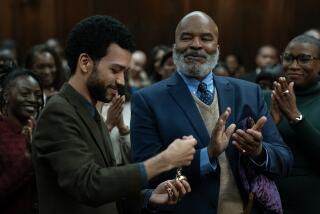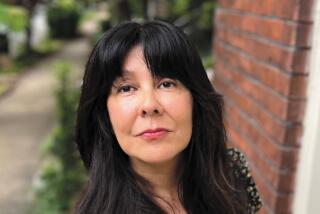Review: Coming of age with Asali Solomon’s ‘Disgruntled’
With her 2006 fiction collection “Get Down,” Asali Solomon established herself as a short-form artist with a knack for writing misfits in black middle-class Philadelphia. Her first novel, “Disgruntled,” is a fitting follow-up — a smart, philosophical coming-of-age tale featuring a vivid protagonist who battles “the shame of being alive.”
When we first meet Kenya Curtis in the late ‘80s, she is in fourth grade at Henry Charles Lea School in West Philadelphia, where she has exactly one friend. Unlike the other kids in her class, Kenya celebrates Kwanzaa, calls her father Baba and is forbidden to eat bologna or say the Pledge of Allegiance. Her classmates, predominantly black, single her out for her peculiar blackness — they laugh at her when she’s scandalized by the N-word, call her an “African bootyscratcher” and greet her with taunts of “boogeddy-boo.”
Kenya’s otherness springs from her unconventional upbringing as the only child of Sheila and Johnbrown Curtis. Sheila is the breadwinner of the family, working a steady job at a public library. Raised by a single mother in the Richard Allen projects, Sheila “loved school, hated being poor, and spent her time at home studying,” eventually winning a scholarship to Franklin & Marshall College, where she was one of three black students in her class.
She is the more stable of Kenya’s parents and often butts heads with her husband, much to Kenya’s dismay. Johnbrown comes from a more privileged background than Sheila, but he resents his parents and rejects their values, their views on race in particular. “He’s so stuck on this business about being black,” his mother tells Kenya, “like he’s the first person to have that problem.”
A sometime house painter and fervent philosopher, Johnbrown attended Cornell to escape the draft but was expelled for trying to take over the administration building. He convenes a group of black compatriots called the Seven Days, who serve as Kenya’s extended family in the absence of aunts, uncles or cousins. The Seven Days devote themselves to various forms of community service. They meet at the Curtis home to talk and share a fellowship tinged with religiosity, pouring out libations for black martyrs.
Johnbrown “could get very excited about the topic of Martin Luther King and how overrated he was”; he prefers to honor lesser-known black historical figures. He develops a particular fascination with Frank Lloyd Wright’s mass-murdering butler Julian Carlton, who killed, among others, Wright’s mistress and her children, after he was fired. (The novel’s title first appears in connection with Carlton, in Johnbrown’s voice: “I’m guessing that more regular outbursts by seriously disgruntled black employees would achieve more than three hundred sixty-five days of peaceful marches.”)
He focuses much of his time and intellectual energy on a mysterious project called the Key, “a contemporary work of black philosophy that would also be a way of living for nonblack peoples who were enlightened,” refusing to get a square job until it’s finished.
This self-referential Key might hold the antidote to “[t]he shame of being alive…a phrase Kenya would hear in her father’s voice” that “wafted in and out of her consciousness like the chorus of a song.” Kenya struggled for years to understand what this meant, but as she was growing up, she “came into increasing consciousness of how fitting it was that Johnbrown had provided the language for this shame. After all, he and Sheila had created a world of opportunity for her to experience it.”
Her shame only morphs and deepens as she grows older, moving from the city to the suburbs, from public school to an all-girls prep school where her father’s grandmother used to clean bathrooms. She befriends the one other black girl in her class despite reservations about her personality and settles into a school life built around a clique that never seems to feel quite comfortable. In the meantime, she deals with sleepwalking, boys and her ever-changing relationships with her parents.
Solomon is a masterful writer, and “Disgruntled” is entertaining and thought-provoking in equal measure. Through her rich depictions of Kenya, her parents and their various friends, she presents a range of approaches to blackness, of different ways of being. She draws attention to some of the inner conflict that accompanies being black in America. This conflict penetrates everything in the characters’ lives, from details like Sheila’s appetite for “a police show that she repeatedly denounced as racist but never missed” to important questions of family, money and education, which become charged and tortured when tangled with questions of race.
“Disgruntled” seems like a book that might face an unfair amount of pigeonholing — not only is its protagonist black and female but its focus on Johnbrown’s philosophy and the almost cultish Seven Days is strange and specific, with a cerebral bent that could put off the casual reader. But Solomon is a skillful guide who presents beauty and complex ideas in clear, accessible prose, with frequent punches of laugh-out-loud humor.
At one point, Johnbrown turns to fiction as part of his treatise, to understand and communicate his rubric of being. “Disgruntled” offers Solomon’s own version of the Key, a philosophical contemplation made tangible and compelling through narrative.
Cha is the author, most recently, of the novel “Beware Beware.”
Disgruntled
A Novel
Asali Solomon
Farrar, Straus and Giroux: 304 pp., $26
More to Read
Sign up for our Book Club newsletter
Get the latest news, events and more from the Los Angeles Times Book Club, and help us get L.A. reading and talking.
You may occasionally receive promotional content from the Los Angeles Times.






